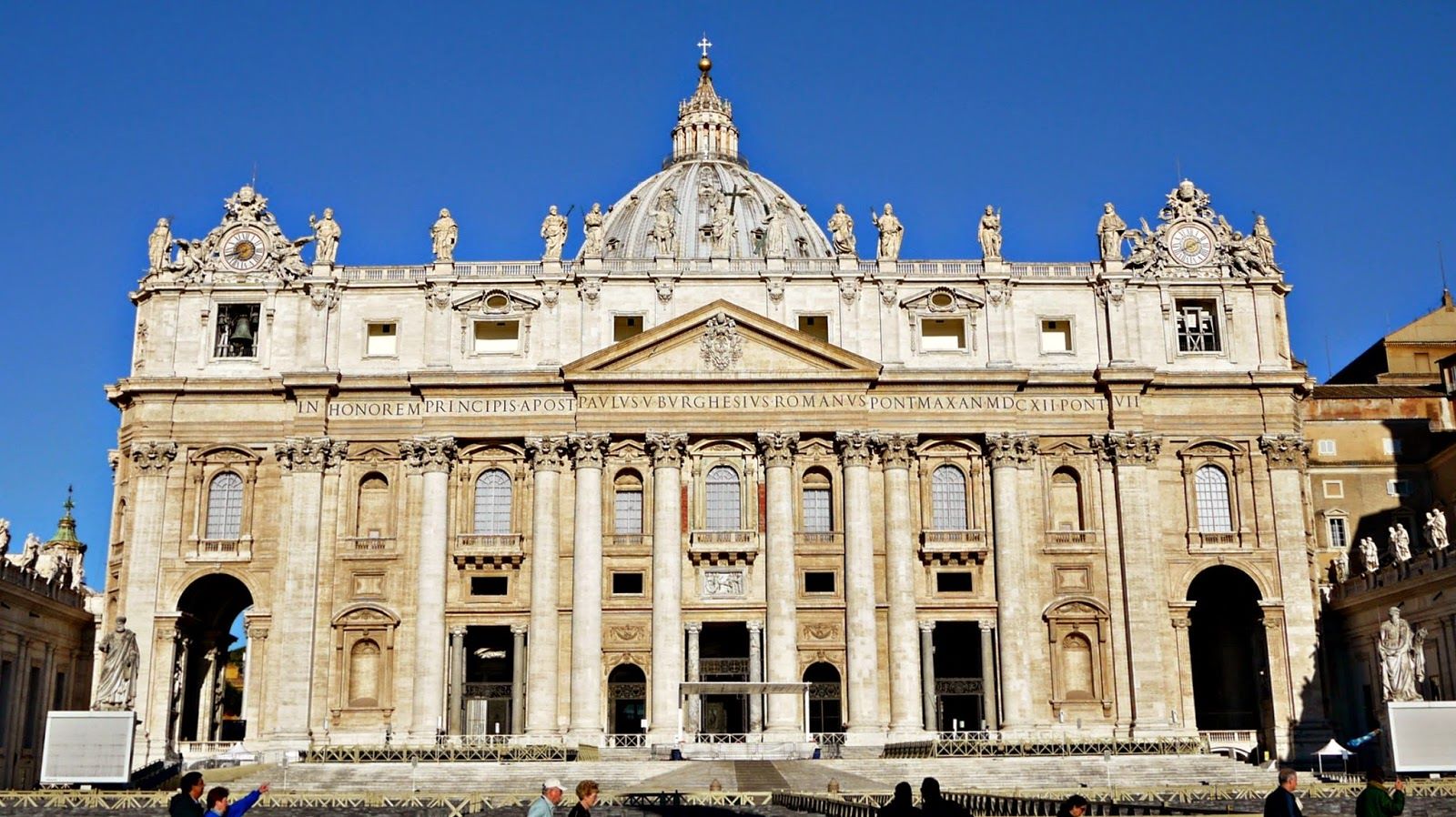Home>Arts and Culture>How To Say Basilica


Arts and Culture
How To Say Basilica
Published: February 10, 2024
Ericka Andersen, an editor at Christian.net, expertly merges digital strategy with content creation, focusing on faith and societal issues. Her communication skills enhance the platform's engaging narratives, fostering meaningful dialogue on belief's impact on society.
Discover the correct pronunciation of "basilica" and improve your arts and culture vocabulary with our helpful guide. Unlock the secrets of saying "basilica" confidently today!
(Many of the links in this article redirect to a specific reviewed product. Your purchase of these products through affiliate links helps to generate commission for Christian.net, at no extra cost. Learn more)
Table of Contents
Introduction
Pronouncing words correctly is an essential aspect of effective communication. It not only reflects one's linguistic proficiency but also conveys respect for the language and culture associated with the word. One such word that often poses a challenge for many individuals is "Basilica." This term holds significant cultural and historical relevance, making it crucial to pronounce it accurately.
The word "Basilica" originates from the ancient Greek "basiliké," meaning "royal." It has been used to describe various architectural structures, particularly in the context of Christian churches. The term "Basilica" is closely linked to grandeur, religious significance, and architectural magnificence, evoking a sense of awe and reverence.
Understanding the correct pronunciation of "Basilica" is not only a matter of linguistic precision but also a means of paying homage to the rich heritage and cultural legacy associated with these monumental structures. Whether discussing the grandeur of the Basilica of Saint Peter in Vatican City or admiring the architectural splendor of the Basilica of the Sagrada Família in Barcelona, pronouncing "Basilica" accurately adds depth and authenticity to the conversation.
In this article, we will delve into the nuances of pronouncing "Basilica" correctly, offering valuable tips to help you articulate this word with confidence and precision. By mastering the pronunciation of "Basilica," you can engage in discussions about historical and religious landmarks with eloquence and authenticity. Let's embark on this linguistic journey to unravel the mystery behind the correct pronunciation of "Basilica" and enhance our communication skills with cultural finesse.
Read more: How To Get To Taal Basilica
Understanding the pronunciation of "Basilica"
The pronunciation of "Basilica" can be a source of confusion for many, primarily due to its historical significance and diverse cultural associations. To accurately pronounce "Basilica," it is essential to comprehend the linguistic origins and phonetic elements embedded within this intriguing word.
The term "Basilica" traces its roots to the ancient Greek word "basiliké," which translates to "royal." This etymological connection underscores the regal connotations associated with basilicas throughout history. In the context of architecture and religion, the term has evolved to represent grandeur, reverence, and spiritual significance.
When pronouncing "Basilica," it is crucial to emphasize the second syllable, "si," with a short "i" sound, followed by the stress on the third syllable, "li," pronounced as "lee." The first syllable, "ba," is enunciated with a short "a" sound, leading to a rhythmic flow that captures the essence of this distinguished word.
The phonetic structure of "Basilica" encompasses a melodic cadence, reflecting the awe-inspiring nature of the architectural marvels and religious sanctuaries it represents. By understanding the phonetic nuances embedded within "Basilica," individuals can articulate this word with eloquence and precision, paying homage to its historical and cultural significance.
Furthermore, recognizing the linguistic heritage of "Basilica" allows for a deeper appreciation of its role in shaping architectural and religious narratives across different civilizations. Whether discussing the majestic Basilica of Saint Mark in Venice or the iconic Basilica of Our Lady of Guadalupe in Mexico City, mastering the pronunciation of "Basilica" enables individuals to engage in conversations with authenticity and cultural finesse.
In essence, understanding the pronunciation of "Basilica" transcends linguistic accuracy; it embodies a profound acknowledgment of the rich historical, architectural, and religious tapestries woven into this captivating word. By embracing the phonetic intricacies of "Basilica," individuals can articulate it with reverence and convey its cultural significance with eloquence, enriching their communication with a touch of historical grandeur.
Tips for saying "Basilica" correctly
Mastering the pronunciation of "Basilica" requires a keen understanding of its phonetic components and a mindful approach to articulating each syllable. Here are valuable tips to help you pronounce "Basilica" with confidence and precision:
-
Emphasize the Second Syllable: When saying "Basilica," place emphasis on the second syllable, "si," pronounced with a short "i" sound. This accentuation adds a rhythmic cadence to the word, capturing its regal and awe-inspiring essence.
-
Enunciate the Third Syllable: Following the emphasis on the second syllable, articulate the third syllable, "li," with a clear "lee" sound. This enunciation contributes to the melodic flow of the word, reflecting the grandeur and reverence associated with basilicas.
-
Mind the First Syllable: Pronounce the first syllable, "ba," with a short "a" sound, leading into the emphasized "si" and enunciated "li." This cohesive pronunciation sequence ensures a harmonious and authentic rendition of the word "Basilica."
-
Practice Stress and Intonation: Pay attention to the stress and intonation patterns while saying "Basilica." The stress on the second and third syllables, coupled with a subtle rise in intonation, adds a nuanced flair to the pronunciation, elevating the word's cultural and historical significance.
-
Listen and Repeat: Engage in active listening to native speakers or audio recordings pronouncing "Basilica." Immerse yourself in the phonetic nuances and cadence of the word, and practice repeating it to internalize the correct pronunciation effectively.
-
Contextual Understanding: Cultivate a contextual understanding of the word "Basilica" by exploring its historical, architectural, and religious contexts. This broader comprehension enhances your ability to articulate the word with authenticity and reverence, reflecting its profound cultural significance.
By incorporating these tips into your language practice, you can confidently pronounce "Basilica" with precision and eloquence, honoring its rich historical and cultural legacy. Whether discussing renowned basilicas such as the Basilica of Saint Peter in Rome or the Basilica of Our Lady of Luján in Argentina, mastering the pronunciation of "Basilica" enriches your communication with a touch of cultural finesse and authenticity.
Common mistakes in pronouncing "Basilica"
Mispronouncing "Basilica" can lead to misunderstandings and detract from the speaker's linguistic finesse. Several common mistakes often arise when attempting to pronounce this culturally significant word. Understanding these pitfalls is crucial for refining one's pronunciation and effectively conveying the grandeur and historical significance associated with basilicas.
-
Misplaced Emphasis: One prevalent mistake involves placing emphasis on the incorrect syllable within "Basilica." Some individuals accentuate the first syllable, "ba," instead of the second syllable, "si," disrupting the word's rhythmic flow and regal connotations. This misplacement of emphasis diminishes the word's intended impact and historical resonance.
-
Vowel Misarticulation: Another common error involves misarticulating the vowels within "Basilica." Pronouncing the short "i" in the second syllable as a long vowel or blending the "a" and "i" sounds together can distort the word's phonetic integrity. Such misarticulations detract from the word's melodic cadence and fail to capture its inherent grandeur.
-
Inconsistent Intonation: Failing to maintain consistent intonation throughout the pronunciation of "Basilica" can lead to a lack of linguistic fluidity. Inadequate attention to the rise and fall of intonation within the word disrupts its rhythmic elegance, undermining the speaker's ability to convey the word's cultural and historical significance effectively.
-
Lack of Contextual Understanding: A fundamental mistake often stems from a lack of contextual understanding of the term "Basilica." Without appreciating the historical, architectural, and religious contexts associated with basilicas, individuals may struggle to pronounce the word authentically. This oversight diminishes the speaker's ability to convey the word's profound cultural significance.
-
Overlooking Phonetic Nuances: Neglecting the phonetic nuances embedded within "Basilica" can lead to inaccurate pronunciation. Disregarding the short and crisp enunciation of each syllable hinders the word's rhythmic flow and diminishes its regal and awe-inspiring essence.
By recognizing these common mistakes and actively addressing them through focused language practice and contextual exploration, individuals can refine their pronunciation of "Basilica." Embracing the word's historical and cultural significance while mastering its phonetic intricacies enables speakers to articulate "Basilica" with authenticity and reverence, enriching their communication with a touch of cultural finesse.
Conclusion
In conclusion, mastering the pronunciation of "Basilica" transcends linguistic accuracy; it embodies a profound acknowledgment of the rich historical, architectural, and religious tapestries woven into this captivating word. By embracing the phonetic intricacies of "Basilica," individuals can articulate it with reverence and convey its cultural significance with eloquence, enriching their communication with a touch of historical grandeur.
The journey to pronounce "Basilica" correctly unveils a deeper appreciation for the word's etymological roots and its evolution across diverse cultural landscapes. Understanding the linguistic heritage of "Basilica" allows for a more profound connection with the architectural marvels and religious sanctuaries it represents. Whether discussing the majestic Basilica of Saint Mark in Venice or the iconic Basilica of Our Lady of Guadalupe in Mexico City, mastering the pronunciation of "Basilica" enables individuals to engage in conversations with authenticity and cultural finesse.
By incorporating valuable tips, such as emphasizing the second syllable, enunciating the third syllable, and practicing stress and intonation, individuals can confidently pronounce "Basilica" with precision and eloquence, honoring its rich historical and cultural legacy. Furthermore, recognizing and addressing common mistakes in pronouncing "Basilica" empowers individuals to refine their linguistic finesse and effectively convey the grandeur and historical significance associated with basilicas.
Ultimately, the correct pronunciation of "Basilica" serves as a gateway to a deeper understanding of the historical, architectural, and religious narratives woven into these monumental structures. It allows individuals to engage in discussions about renowned basilicas with confidence, authenticity, and a profound sense of cultural reverence. By mastering the pronunciation of "Basilica," individuals not only enhance their communication skills but also pay homage to the enduring legacy of these awe-inspiring edifices, enriching their linguistic repertoire with a touch of cultural finesse and historical grandeur.















